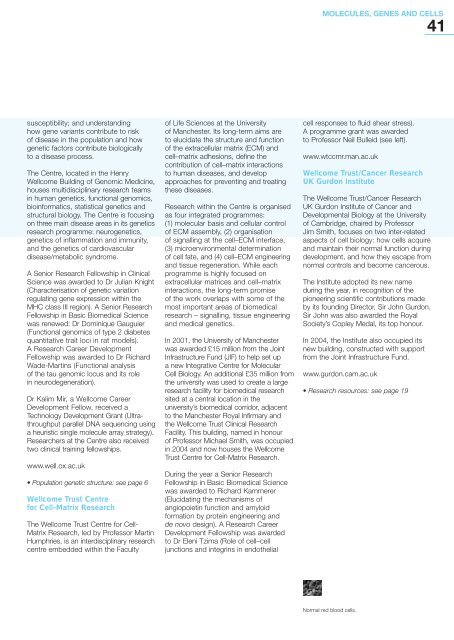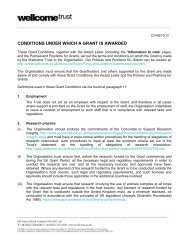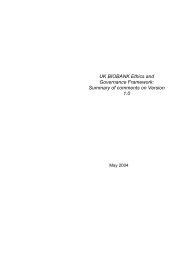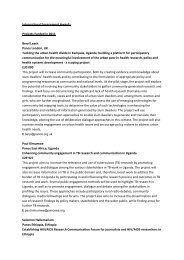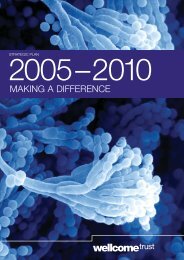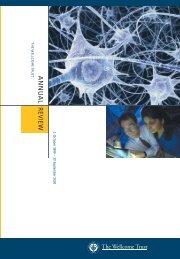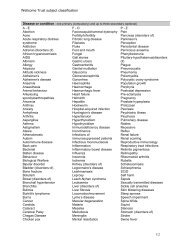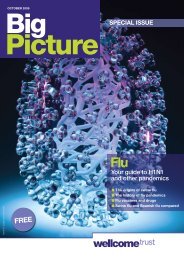MOLECULES, GENES AND CELLS40MOLECULES, GENES AND CELLSThe Molecules, Genes and Cells stream aims to support high-quality researchthat will further our understanding of the fundamental molecular, cellular and geneticprocesses involved in health and disease.During the year, 75 awardswere made, including nine newprogramme grants or renewals,to a total value of £21.8 million.Two Principal Research Fellowshipswere renewed: to Professor AngusLamond (University of Dundee),for his structural and functionalanalysis of the mammalian cellnucleus, and to Professor BillEarnshaw (University of Edinburgh)for his studies of non-histonechromosomal proteins in mitosisand apoptosis.Membrane trafficking and proteinfolding were notable themes in thisyear’s molecular and cell biologyfunding. Professor Margaret Robinson(University of Cambridge) had theprogramme grant associated withher Principal Research Fellowshipon coated vesicle adaptors renewed.She is characterising the adaptorprotein complexes that facilitatethe transport of cargo betweenintracellular organelles. A new lineof investigation will focus on how thehuman immunodeficiency virus (HIV)may exploit adaptor proteins to evadethe immune response.Professor Colin Stirling (Universityof Manchester) received continuedprogramme grant funding for studiesof protein biogenesis in the yeastendoplasmic reticulum. By using boththe powerful genetic systems of yeastand biochemical approaches, hisgroup will investigate the partitioningof proteins into the secretory pathwayvia the endoplasmic reticulum andthe role of the translocon complexand associated chaperones.Professor Neil Bulleid (Universityof Manchester) was awarded aprogramme grant to continuehis studies on oxidative foldingin the mammalian endoplasmicreticulum. His group studies the redoxconditions within the endoplasmicreticulum that allow proteins, particularlythose containing disulphide bonds,to fold correctly.Professor Christopher Dobson(University of Cambridge) receivedcontinued programme grant fundingto study protein folding and misfoldingusing an array of biophysicaltechniques and theoretical simulations.Several important and innovativegrants were also funded in the areaof epigenetics and gene silencing.Jane Mellor (University of Oxford) wasawarded a programme grant toelucidate the role of a novel chromatinremodelling ATPase in gene silencingand gene regulation.Professor Constanze Bonifer (Universityof Leeds) received continued projectgrant funding for her studies on theepigenetic mechanisms regulating theexpression of the lysozyme gene, whileDr Brian Hendrich (University ofEdinburgh) was awarded a grant,complementing his ongoing <strong>Wellcome</strong>fellowship support, to investigate theepigenetic silencing mechanisms in cellfate decisions. Dr Maria Vogelauerreceived a Research CareerDevelopment Fellowship to study themolecular mechanisms by whichhistone acetylation regulates the timingof replication origin firing.Biological chemistryThe partnership with the Royal Societyof Chemistry to encourage the areaof chemical biology continued duringthe year. A successful workshop on‘Chemistry at the Biological Interface’was held at the University of Warwickin September <strong>2004</strong>. The participants,from universities in and around theMidlands, enthusiastically discussedcollaborative projects and it is likely thatseveral new grants will be submittedfrom ideas first aired at the workshop.<strong>Wellcome</strong> <strong>Trust</strong> Centrefor Cell BiologyThe <strong>Wellcome</strong> <strong>Trust</strong> Centre for CellBiology at the University of Edinburgh,led by Professor Adrian Bird, seeksto understand the fundamentalcharacteristics of living things at thecellular level, such as growth, movement,self-replication and development.It has particular strengths in the studyof RNA, including its transcription,processing, transport and destruction;the cell division cycle; and geneexpression in developing systems,particularly epigenetic processes suchas DNA methylation.During the year Professor Bill Earnshaw’sPrincipal Research Fellowship wasrenewed (see left), as was Dr KennethSawin’s Senior Research Fellowshipin Basic Biomedical Science (Regulationof eukaryotic microtubule nucleationand microtubule-mediated cell polarity).A Research Career DevelopmentFellowship was awarded to Dr MariaVogelauer (see left).Professor David Tollervey, a <strong>Wellcome</strong>Principal Research Fellow at the Centre,was elected to the Royal Society, whileProfessor Jean Beggs was awardedthe Royal Society Darwin <strong>Trust</strong>Research Professorship.www.wcb.ed.ac.uk/intro.htm• RNA-based gene silencing: see page 19<strong>Wellcome</strong> <strong>Trust</strong> Centrefor Human GeneticsThe <strong>Wellcome</strong> <strong>Trust</strong> Centre for HumanGenetics at the University of Oxford,led by Professor Tony Monaco, studiesthe mechanisms controlling geneticsusceptibility to human disease. Thisincludes the localisation and identificationof disease genes; functional analysis ofgene variants responsible for
MOLECULES, GENES AND CELLS41susceptibility; and understandinghow gene variants contribute to riskof disease in the population and howgenetic factors contribute biologicallyto a disease process.The Centre, located in the Henry<strong>Wellcome</strong> Building of Genomic Medicine,houses multidisciplinary research teamsin human genetics, functional genomics,bioinformatics, statistical genetics andstructural biology. The Centre is focusingon three main disease areas in its geneticsresearch programme: neurogenetics,genetics of inflammation and immunity,and the genetics of cardiovasculardisease/metabolic syndrome.A Senior Research Fellowship in ClinicalScience was awarded to Dr Julian Knight(Characterisation of genetic variationregulating gene expression within theMHC class III region). A Senior ResearchFellowship in Basic Biomedical Sciencewas renewed: Dr Dominique Gauguier(Functional genomics of type 2 diabetesquantitative trait loci in rat models).A Research Career DevelopmentFellowship was awarded to Dr RichardWade-Martins (Functional analysisof the tau genomic locus and its rolein neurodegeneration).Dr Kalim Mir, a <strong>Wellcome</strong> CareerDevelopment Fellow, received aTechnology Development Grant (Ultrathroughputparallel DNA sequencing usinga heuristic single molecule array strategy).Researchers at the Centre also receivedtwo clinical training fellowships.www.well.ox.ac.uk• Population genetic structure: see page 6<strong>Wellcome</strong> <strong>Trust</strong> Centrefor Cell-Matrix ResearchThe <strong>Wellcome</strong> <strong>Trust</strong> Centre for Cell-Matrix Research, led by Professor MartinHumphries, is an interdisciplinary researchcentre embedded within the Facultyof Life Sciences at the Universityof Manchester. Its long-term aims areto elucidate the structure and functionof the extracellular matrix (ECM) andcell–matrix adhesions, define thecontribution of cell–matrix interactionsto human diseases, and developapproaches for preventing and treatingthese diseases.Research within the Centre is organisedas four integrated programmes:(1) molecular basis and cellular controlof ECM assembly, (2) organisationof signalling at the cell–ECM interface,(3) microenvironmental determinationof cell fate, and (4) cell–ECM engineeringand tissue regeneration. While eachprogramme is highly focused onextracellular matrices and cell–matrixinteractions, the long-term promiseof the work overlaps with some of themost important areas of biomedicalresearch – signalling, tissue engineeringand medical genetics.In 2001, the University of Manchesterwas awarded £15 million from the JointInfrastructure Fund (JIF) to help set upa new Integrative Centre for MolecularCell Biology. An additional £35 million fromthe university was used to create a largeresearch facility for biomedical researchsited at a central location in theuniversity’s biomedical corridor, adjacentto the Manchester Royal Infirmary andthe <strong>Wellcome</strong> <strong>Trust</strong> Clinical ResearchFacility. This building, named in honourof Professor Michael Smith, was occupiedin <strong>2004</strong> and now houses the <strong>Wellcome</strong><strong>Trust</strong> Centre for Cell-Matrix Research.During the year a Senior ResearchFellowship in Basic Biomedical Sciencewas awarded to Richard Kammerer(Elucidating the mechanisms ofangiopoietin function and amyloidformation by protein engineering andde novo design). A Research CareerDevelopment Fellowship was awardedto Dr Eleni Tzima (Role of cell–celljunctions and integrins in endothelialcell responses to fluid shear stress).A programme grant was awardedto Professor Neil Bulleid (see left).www.wtccmr.man.ac.uk<strong>Wellcome</strong> <strong>Trust</strong>/Cancer ResearchUK Gurdon InstituteThe <strong>Wellcome</strong> <strong>Trust</strong>/Cancer ResearchUK Gurdon Institute of Cancer andDevelopmental Biology at the Universityof Cambridge, chaired by ProfessorJim Smith, focuses on two inter-relatedaspects of cell biology: how cells acquireand maintain their normal function duringdevelopment, and how they escape fromnormal controls and become cancerous.The Institute adopted its new nameduring the year, in recognition of thepioneering scientific contributions madeby its founding Director, Sir John Gurdon.Sir John was also awarded the RoyalSociety’s Copley Medal, its top honour.In <strong>2004</strong>, the Institute also occupied itsnew building, constructed with supportfrom the Joint Infrastructure Fund.www.gurdon.cam.ac.uk• Research resources: see page 19Normal red blood cells.


